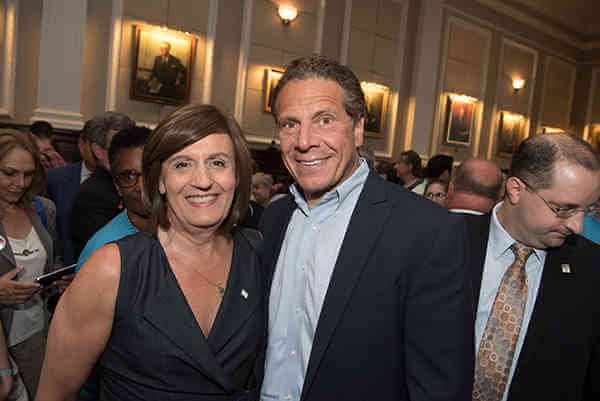Like most of you, I’m sure, I greeted the recent unsigned Times op-ed piece by a senior member of the Rump administration with unadulterated glee. It painted a gratifyingly ugly portrait of dysfunction, secret rebellion, and presidential madness that confirmed what most Americans already suspected — that Rump is an out-of-control cretin whose aims, many of his advisors privately agree, must be thwarted for the good of the nation. The situation is so bad, the anonymous senior staffer wrote, that several of his or her colleagues actually considered invoking the Constitution’s 25th Amendment, which provides the vice president with the power to take over the government in the event the president can no longer function in the role by reason of illness, either physical or mental.
My merriment was cut short, however, by the New Yorker’s Masha Gessen, who pointed out why the anonymous op-ed piece was nothing to celebrate. Gessen, a fiercely intelligent and fearless writer, was born — and lived much of her life — in Russia. She has said she was “probably the only publicly out gay person in the whole country.” The mother of three moved to the US in 2013 after Russian authorities began floating the idea of taking children away from their LGBTQ parents. Unlike Rump, she is not a fan of Vladimir Putin.
“Only the day before the Op-Ed was published,” Gessen writes, “excerpts from Bob Woodward’s new book, ‘Fear,’ added to the ever-accumulating picture of chaos, mendacity, fear, embattlement, and contempt for the President even within his senior staff. But, while the content of the anonymous Op-Ed is not newsworthy, in the sense of providing new information, the fact of its publication certainly is.”
Focusing on the fact that the op-ed writer is anonymous, Gessen points out that this is precisely the problem: “While this may be the country’s salvation in the short run, it also plainly signals the demise of some of its most cherished ideals and constitutional norms. An anonymous person or persons cannot govern for the people, because the people do not know who is governing.”
“I don’t doubt the editors’ serious intentions,” Gessen goes on, “though I happen to disagree — the content of the Op-Ed does not strike me as newsworthy. But that’s not the point. The thing about autocracies, or budding autocracies, is that they present citizens with only bad choices. At a certain point, one has to stop trying to find the right solution and has to look, instead, for a course of action that avoids complicity. By publishing the anonymous Op-Ed, the Times became complicit in its own corruption.”
This was the moment that turned my already-fading joy into Mother’s sick headache. (I’m Mother.) Gessen is right; the manifest content of the op-ed is not news. Every non-crank account of this White House presents a portrait of incompetence, chaos, and corruption. I’d argue, though, that what makes it newsworthy is the fact of its existence, the claim that a secret group of senior staffers is deliberately trying to thwart Rump and his agenda, a claim made by one of the conspirators. I’m hoping that this inner circle has a secret handshake. A secret handshake would, as they say, be awesome.
Gessen continues: “The media are being corrupted every time they engage with a nonsensical, false, or hateful Trump tweet (although not engaging with these tweets is not an option). They are being corrupted every time journalists act polite while the President, his press secretary, or other Administration officials lie to them. They are being corrupted every time a Trumpian lie is referred to as a ‘falsehood,’ a ‘factually incorrect statement,’ or as anything other than a lie. They are being corrupted every time journalists allow the Administration to frame an issue, like when they engage in a discussion about whether the separation of children from their parents at the border is an effective deterrent against illegal immigration. They are being corrupted every time they use the phrase ‘illegal immigration.’”
Gessen is on a tear; I haven’t been as excited by a piece of journalism since I don’t know when. She goes on: “The author… refers to the ‘unsung heroes’ of the Administration, the people who, he writes, work to insulate their departments from the President’s whims, tantrums, and, it seems, eyes — insuring that actual policy is sometimes the very opposite of what is described in Trump’s public rhetoric. The problem here is with the term ‘unsung heroes,’ which usually refers to people who are hidden from the public eye, not to public persons who intentionally conceal the substance of their actions. A lack of transparency in government is a constitutional crisis in the making, not an unrecognized feat of heroism. Also, one must note that the author of the Op-Ed is very much singing his own praises, albeit anonymously. (For now, anyway. His, or her, identity will almost inevitably be revealed.)”
I’m fond of Gessen’s skeptical perception of the public nature of a private act: the anonymous staffer decided, on his or her own, to write a hit piece attacking Rump and got it published it in a very widely read newspaper, thereby “singing his own praises” to a readership of millions.
“I would even argue that by claiming, anonymously, to have usurped some of the power of the Presidency, the author has separated himself from the people, rendering the phrase ‘we as a nation’ doubly false,” Gessen continues.
“Yes, it’s complicated,” she concludes. “We are, as a nation, grateful that James Mattis actively muffles Trump’s outbursts, but we should also be aware that he is laying the groundwork for Defense Secretaries to act against the wishes and possibly even the orders of future Presidents. This is part of the degradation that the author describes in this passage, while failing to acknowledge that he has been an active perpetrator of that degradation, not a passive victim.”
Gessen concludes with a flourish: “In the last paragraph, the author uses a sleight of hand that has become so common that it is barely noticeable. He conjures ‘everyday citizens rising above politics, reaching across the aisle and resolving to shed the labels in favor of a single one: Americans.’ This familiar sentiment seems utterly unrelated to the rest of the piece, but it is serving a purpose here. The author is claiming common ground with people ‘across the aisle’ — perhaps the people behind the very resistance that he put in condescending scare quotes earlier in the piece. He is also inveighing against politics. In doing this, he is lying twice. A person who works for probably the most aggressively partisan Administration in American history has no business asking anyone to reach across the aisle, and his implied claim of common cause with bipartisanship is a lie. His other lie is juxtaposing ‘common ground’ and politics. Politics is not the opposite of common ground; politics is the very process of finding common ground and making it inhabitable. Trump has been waging war on politics itself for more than two years. The anonymous member of his Administration who is bragging about his membership in a secret government has just opened a second front in this war.”
Gessen’s lesson? That the existence of a secret government of unelected officials, no matter how personally gratifying the revelation may be, is in nobody’s best interests — except perhaps of those Freemason-like bureaucrats who are manipulating a clownish nincompoop outside the ever-dimming light of public scrutiny.




































